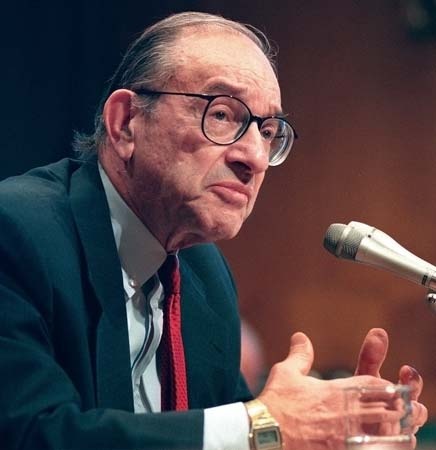Greenspan, Alan
American economist
born March 6, 1926, New York, New York, U.S.
 American economist and chairman of the Board of Governors of the Federal Reserve System, whose chairmanship (1987–2006) continued through the administrations of four American presidents.
American economist and chairman of the Board of Governors of the Federal Reserve System, whose chairmanship (1987–2006) continued through the administrations of four American presidents.At age five Greenspan demonstrated his proficiency in mathematics by reciting baseball batting averages and performing large calculations in his head. As a youth he studied music at the Juilliard School and played jazz saxophone and clarinet in the Henry Jerome band. He went on to study economics at New York University (B.A., 1948; M.A., 1950) and began work on a doctorate at Columbia University under economist and future Federal Reserve Board chairman Arthur F. Burns. He met novelist Ayn Rand (Rand, Ayn) in 1952 and adopted her philosophy of individual effort, self-interest, and laissez-faire capitalism.
Greenspan left Columbia in 1953 and formed Townsend-Greenspan and Co., Inc., an economic consulting firm in New York. After William Townsend's death in 1958, Greenspan became president and chief owner. Following Rand's urging, he served in 1967 as an adviser for Richard Nixon (Nixon, Richard M.)'s 1968 presidential election campaign. Greenspan helped with Nixon's transition to the office but refused a permanent appointment in the Nixon administration, advising the president only informally and serving on presidential task forces and commissions. As chairman of the Council of Economic Advisers (1974–77) during Gerald Ford's presidency, Greenspan promoted policies that caused the rate of inflation to drop from 11 to 6.5 percent. In 1977 Greenspan returned to his firm in New York and became an adjunct professor at New York University, where he was awarded a Ph.D. in economics.
Appointed by President Ronald Reagan (Reagan, Ronald W.) to fill Paul A. Volcker (Volcker, Paul)'s term as chairman of the Federal Reserve Board, Greenspan took office on August 11, 1987. During the years of his chairmanship, Greenspan became known for his decisive use of monetary policy in steering the economy between the hazards of inflation and recession. When the Dow Jones Industrial Average (Dow Jones average) fell a record 508 points on October 19, 1987, shortly after he took command at the Fed, he acted quickly to ensure liquidity in the markets. When Asian countries underwent a financial crisis and an economic downturn beginning in 1997, he lowered U.S. interest rates to cushion the economy. As the Asian economies recovered and the U.S. economy continued its solid expansion, he initiated a series of interest-rate hikes in June 1999. He also drew the public's attention to what he called “unsustainable” rates of growth in the U.S. economy and “overextended” stock prices toward the end of the 20th century.
Greenspan was given a share of the credit for the longest official economic expansion in U.S. history (March 1991–February 2000). His influence on global finance was considered so extensive that in September 1999 The Sunday Times of London named him one of the three most powerful people in the British Isles. International recognition of Greenspan's achievements continued: in 2000 the French government awarded him the Legion of Honour, and in 2002 Queen Elizabeth II of the United Kingdom named him an honorary Knight of the British Empire. Greenspan retired as chairman of the Federal Reserve Board in January 2006. He published a memoir, The Age of Turbulence: Adventures in a New World, in 2007.
- proteolytic enzyme
- Proterozoic Eon
- Protesilaus
- Protestant Church in The Netherlands
- Protestant ethic
- Protestant Heritage
- Protestantism
- Protestant Orthodoxy
- Protestant Union
- Proteus
- Protevangelium of James
- prothallium
- prothrombin
- protist
- protium
- Protić, Stojan
- Protoceratops
- protochordate
- Protocol of Rio de Janeiro
- protocol sentence
- Protocols of the Learned Elders of Zion
- Proto-Corinthian style
- Proto-Dravidian consonants
- protoenstatite
- protogalaxy